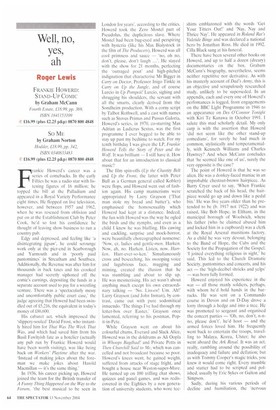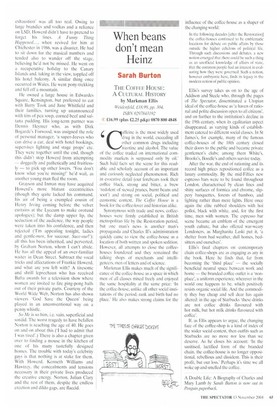Well, no, yes, ah
Roger Lewis
FRANKIE HOWERD: STAND-UP COMIC by Graham McCann Fourth Estate, £18.99, pp. 369, ISBN 1841153109 ("t: £16.99 (plus £2.25 p&p) 0870 800 4848 SO ME by Graham Norton Hodder, £18.99, pp. 342, ISBN 0340833483 ("4.. £16.99 (plus £2.25 p&p) 0870 800 4848 Frankie Howerd's career was a series of comebacks. In the early Fifties he was a radio star with listening figures of 16 million; he topped the bill at the Palladium and appeared in a Royal Variety Performance eight times. He flopped on live television, however, and between 1957 and 1962, when he was rescued from oblivion and put on at the Establishment Club by Peter Cook, he'd so lost his confidence he thought of leaving show business to run a country pub.
Edgy and depressed. and feeling like 'a disintegrating jigsaw', he could scrounge work only at the pier-end in Scarborough and Yarmouth and in 'poorly paid pantomimes' in Streatham and Southsea. Additionally, the Revenue was after him for thousands in back taxes and his crooked manager had secretly siphoned off the comic's earnings, depositing the funds in a separate account used to pay for a wrestling venture. There was a 'spectacularly messy and uncomfortably public court case,' the judge agreeing that Howerd had been swindled out of £5,216, the equivalent in today's money of £86,600.
His cabaret act, which impressed the `slippery-souled' David Frost, who instantly hired him for That Was The Week That Was, and which had saved him from his Basil Fawityish fate as a hotelier (actually any pub run by Frankie Howerd would have been worth visiting), was like being back on Workers' Playtime after the war. 'Instead of making jokes about the foreman we make jokes about Harold Macmillan — it's the same thing.'
In 1936, his career picking up, Howerd joined the team for the British transfer of A Funny Thing Happened on the Way to the Forum, the best musical to be seen in London for years', according to the critics. Howerd took the Zero Mostel part of Pseudolus, the duplicitous slave. Where Mostel had been bug-eyed and perspiring with hysteria (like his Max Bialystock in the film of The Producers), Howerd was all cool primness and sauce 'no, oh no, don't, please, don't laugh ...'. He stayed with the show for 21 months, perfecting the 'outraged pout' and high-pitched indignation that characterise Mr Bigger in Carry on Doctor, Professor Inigo Tinkle in Carry on Up the Jungle, and of course Lurcio in Up Pompeii! Lurcio, sighing and shrugging his shoulders, the servant with all the smarts, clearly derived from the Sondheim production. With a corny script by Talbot Rothwell, and a cast with names such as Stovus Primus and Pussus Galoria, Howerd's series, in 1970, co-starring Max Adrian as Ludicrus Sextus, was the first programme I ever begged to be able to stay up past my bedtime to watch. For my tenth birthday I was given the LP, Frankie Howerd Tells the Story of Peter and the Wolf. It was brilliant — I still have it. How about that for an introduction to classical music?
The film spin-offs (Up the Chastity Belt and Up the Front, the latter with Peter Bull as a German general called Kohler) were flops, and Howerd went out of fashion again. His camp mannerisms were appropriated by Larry Grayson (`That man stole my bread and butter'), who emphasised the homosexuality which Howerd had kept at a distance. Indeed, the fun with Howerd was the way he ogled the birds and the nymphs, and even as a child I knew he was bluffing. His cawing and cackling, surprise and mock-horror, were beautifully choreographed nonsense: 'Now, Cr, ladies and gentle-men, Harken. Now, ah, no. Harken. Listen, now. Harrken. Harr-ever-so-ken.' Simultaneously cross and beseeching, his swooping voice and lugubrious face, mugging and miming, created the illusion that he was stumbling and about to slip up. He was mesmerising. His act wasn't about anything much except his own extraordinary talking — `No. Liss-en? Urn. Ah!' Larry Grayson (and John Inman), by contrast, came out with pure sodomitical innuendo. The things I've had through my letter-box over Easter,' Grayson once lamented, referring to his postman, Popit-in-Pete.
While Grayson went on about his colourful chums, Evcrard and Slack Alice, Howerd was in the doldrums as Ali Oopla in Whoops Bagdhad! and Private Potts in Then Churchill Said to Me, which was cancelled and not broadcast because so poor. Howerd's knees went, he gained weight, suffered from attacks of stage fright, and bought a house near Weston-super-Mare. He turned up on 100 trifling chat shows, quizzes and panel games. and was rediscovered in the Eighties by a new generation of university students, who wore tee
shirts emblazoned with the words 'Get Your Titters Out!' and 'Nay, Nay and Thrice Nay'. He appeared in Roland Rat's Yuletide Binge and was declared a national hero by Jonathan Ross. He died in 1992. Cilia Black sang at his funeral.
There have been several other books on Howerd, and up to half a dozen (dreary) documentaries on the box. Graham McCann's biography, nevertheless, seems neither repetitive nor derivative. As with his masterly account of Dad's Army, this is an objective and scrupulously researched study, unlikely to be superseded. In an appendix, each and every one of Howerd's perfomances is logged, from engagements on the BBC Light Programme in 1946 to an appearance on Des O'Connor Tonight with Kin i Te Kanawa in October 1991. I salute this mad scholarly detail. My only carp is with the assertion that Howerd 'did not seem like the other stand-up comedians', for surely he had much in common, stylistically and temperamentally, with Kenneth Williams and Charles Hawtrcy? And when McCann concludes that he seemed like one of us', surely the very opposite is the case?
The point of Howerd is that he was so alien. He was a donkey-faced maniac in an improbable chestnut-brown hairpiece. As Barry Cryer used to say, 'When Frankie scratched the back of his head, the hairpiece would go up and down like a pedal bin.' He was five years older than he pretended to be (b. 1917 not 1922) and was raised, like Bob Hope, in Eltham, in the municipal borough of Woolwich, where his father (who he claimed abused him and locked him in a cupboard) was a clerk at the Royal Arsenal munitions factory. As a child he was very devout, belonging to the Band of Hope, the Cubs and the Society for the Propagation of the Gospel. 'I joined everything religious in sight,' he said. This led to the Church Dramatic Society, pantomimes and concerts, and his act — the 'high-decibel shrieks and yelps' — was born fully formed.
Howerd enjoyed his experience in the war — all those manly soldiers, perhaps, with whom he'd hold hands in the barracks. He was sent on a Commando course in Devon and on D-Day drove a lorry through a hedge and into a tree. He was promoted to sergeant and organised the concert parties — 'Oh, no, don't, n-nno, please don't', he'd hoot — and the armed forces loved him. He frequently went back to entertain the troops, travelling to Malaya, Korea, Ulster; he also went aboard the Ark Royal. It was an act, really, rambling around the possibility of inadequacy and failure and deflation; but as with Tommy Cooper's magic tricks, you knew it would come right. Every mumble and stutter had to be scripted and polished, usually by Eric Sykes or Galton and Simpson.
Sadly, during his various periods of decline and humiliation, the 'nervous
exhaustion' was all too real. Owing to large brandies and vodkas and a reliance on LSD, Howerd didn't have to pretend to forget his lines. A Funny Thing Happened..., when revived for him at Chichester in 1986, was a disaster. He had to sit down for the musical numbers and tended also to wander off the stage, believing he'd not be missed. He went on a recuperative holiday to the Canary Islands and, taking in the view, toppled off his hotel balcony. A similar thing once occurred in Wales. Ile went pony-trekking and fell off a mountain.
He owned a large house in Edwardes Square, Kensington, but preferred to eat with Barry Took and June Whitfield and their families, turning up unannounced with tins of pea soup, corned beef and sultana pudding. Ills long-term partner was Dennis Heymer who, as with Dirk Bogarde's Forwood, was assigned the role of personal manager, 'a super-Jeeves who can drive a car, deal with hotel bookings, supervises lighting and stage props' etc. They were together until the end, though this didn't stop Howerd from attempting — doggedly and pathetically and fruitlessly — to pick up other lovers. 'You don't know what you're missing!' he'd wail, as another young man fled the room.
Grayson and Inman may have acquired Howerd's more blatant eccentricities (though they quite lacked his command, his air of being a crumpled cousin of Henry Irving coming before the velvet curtains at the Lyceum to make orotund apologies); but the damp upper lip, the seduction of the audience, the way people were taken into his confidence, and then rejected ('I'm appealing tonight, ladies and gentle-men, for succour. Succ-our!): all this has been inherited, and perverted, by Graham Norton, whom I can't abide. He has all the appeal of an over-familiar waiter in Dean Street. Subtract the vocal tricks and affectations of Frankie Howerd, and what are you left with? A tiresome and shrill leprechaun who has received Bafta awards for a television show where women are invited to fire ping-pong halls out of their private parts. Courtesy of the World Wide Web, Norton has also shown viewers 'God Save the Queen' being played in an unconventional way on a penny whistle.
So Me is so him, i.e. vain, superficial and sordid. The worst tragedy to have befallen Norton is reaching the age of 40. He goes on and on about this CI had to admit that I was tired'.) There is also a chapter given over to finding a mouse in the kitchen of one of his many tastefully designed homes. The trouble with today's celebrity gays is that nothing is at stake for them. With Howerd, Kenneth Williams and Hawtrey, the concealments and tensions necessary in their private lives produced the creative energy. Norton, Julian Clary and the rest of them, despite the endless erection and dildo gags, are flaccid.



























































































 Previous page
Previous page